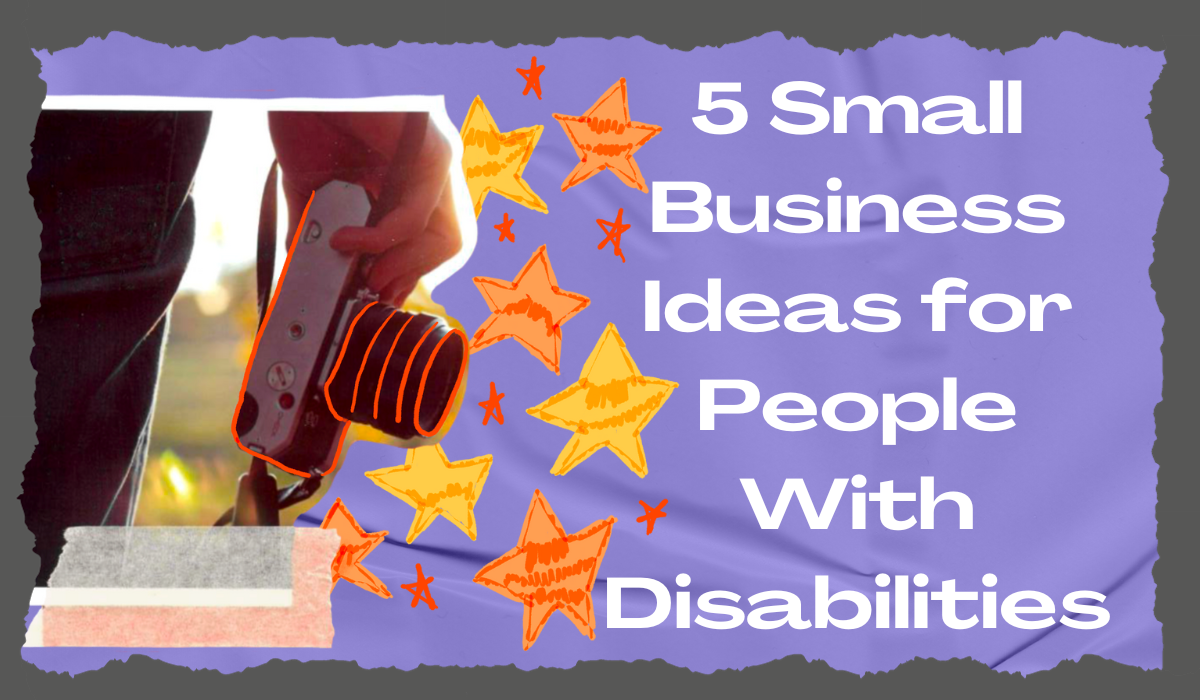Anybody can start a microenterprise, but you need a good starting point to begin from.
If you don’t have any ideas for what kind of business you want to start, or want guidance on how working with a disability, here’s our list of 5 microenterprise ideas and how to make them work with your disability, rather than against.
- Blogging
- Arts and Crafts
- Tutoring
- Delivery
- Entertaining
If you want to learn more about Microenterprises, you can read all about them on our services page.
1. Blogging
The beautiful thing about language is everyone can use it. If you can string together sentences, you can write something that touches the hearts and minds of people across the globe. Whether you enjoy writing fiction or nonfiction, now is the easiest time in history to get published and share your unique perspective with the world.
It’s easy to be published on websites like Medium and Simly, take writing commissions on Fiverr, or even start your own blog about a specialist topic that interests you.
If you want to take it to the next level, you can make a vlog instead and post videos on platforms like YouTube and Instagram, rather than relying purely on written words.
Why it’s good for people with disabilities: If you have computer literacy and are a talented writer, or looking to improve, publishing your writing is a fantastic and straightforward way to hone your skills and make your name known without needing to leave your home.
2. Arts & Crafts
For many people with crafty hobbies, the possibility of turning it into a job has crossed their mind. That thought can turn into a reality with the right effort. Whether you like knitting, sewing, painting, beading, or something else entirely there are people looking for crafts as bespoke gifts and collection pieces. The key is to put yourself into a schedule of keeping up your production without burning out, and finding the right place to sell your products.
Arch Association already has a success story with a crafts business in Kayla’s Little Trinkets.
Why it’s good for people with disabilities: Creating arts and crafts can be done at home and integrated into your life schedule. Turning it from a hobby into a microenterprise means you already have the love and motivation to continue doing the work, making it much more enjoyable, and going out to sell your crafts can be a great community access experience.
3. Tutoring
Everybody is a specialist in something. If you have a skill or area of knowledge you think other people would want to learn about, you can be a tutor or lecturer on that topic. This can take lots of forms, like teaching one-on-one music classes, tutoring students in a subject you’re knowledgable about at school, or even recording lectures and posting them online.
Why it’s good for people with disabilities: Tutors get to set their own hours and focus on something they’re already passionate about. Teaching another person is a great way to learn how to communicate with people and structure your thoughts and ideas in ways that are clear and helpful.
4. Delivery
In this busy world, people need things brought to them when they don’t have the time or expertise to get it themselves. Delivery is a fantastic job if you have your own car and drivers licence. While you can start as a delivery driver for an existing company, starting your own to deliver a service can be a unique microenterprise if you have some creativity.
To succeed as a delivery business, you need a unique business proposition. Something people or businesses need to send or receive a recurring basis. For example, businesses need secure documents to be removed for shredding, and people may want unique products delivered to them by businesses that aren’t traditionally found on delivery apps, such as book hire.
Why it’s good for people with disabilities: Delivery drivers work to structured routines, able to make plans before acting upon them. Depending on the type of delivery, you may also be able to set your own hours.
5. Entertaining
Party entertainers are always in demand for kids and adult parties alike. Whether you’re talented in music, face painting, stage magic, or something else entirely, people may want your skills to entertain their guests at a party or public event.
Try making a showreel video that shows off your talents and posting it on social media to let people know that you’re the kind of person who they would want to enjoy.
Why it’s good for people with disabilities: Entertainers get to choose their days and hours. Although the environments they work in are loud and social, you can work within that expectation and use the opportunity to build social skills. It’s also a great opportunity to show off what you love to a willing audience.
And more!
There are countless other ways to put your skills into work, these are just 5 ideas. Tell us about your small business ideas in the comments.
And if you want to learn the steps you need to start your microenterprise, you can find our article here.


Comments